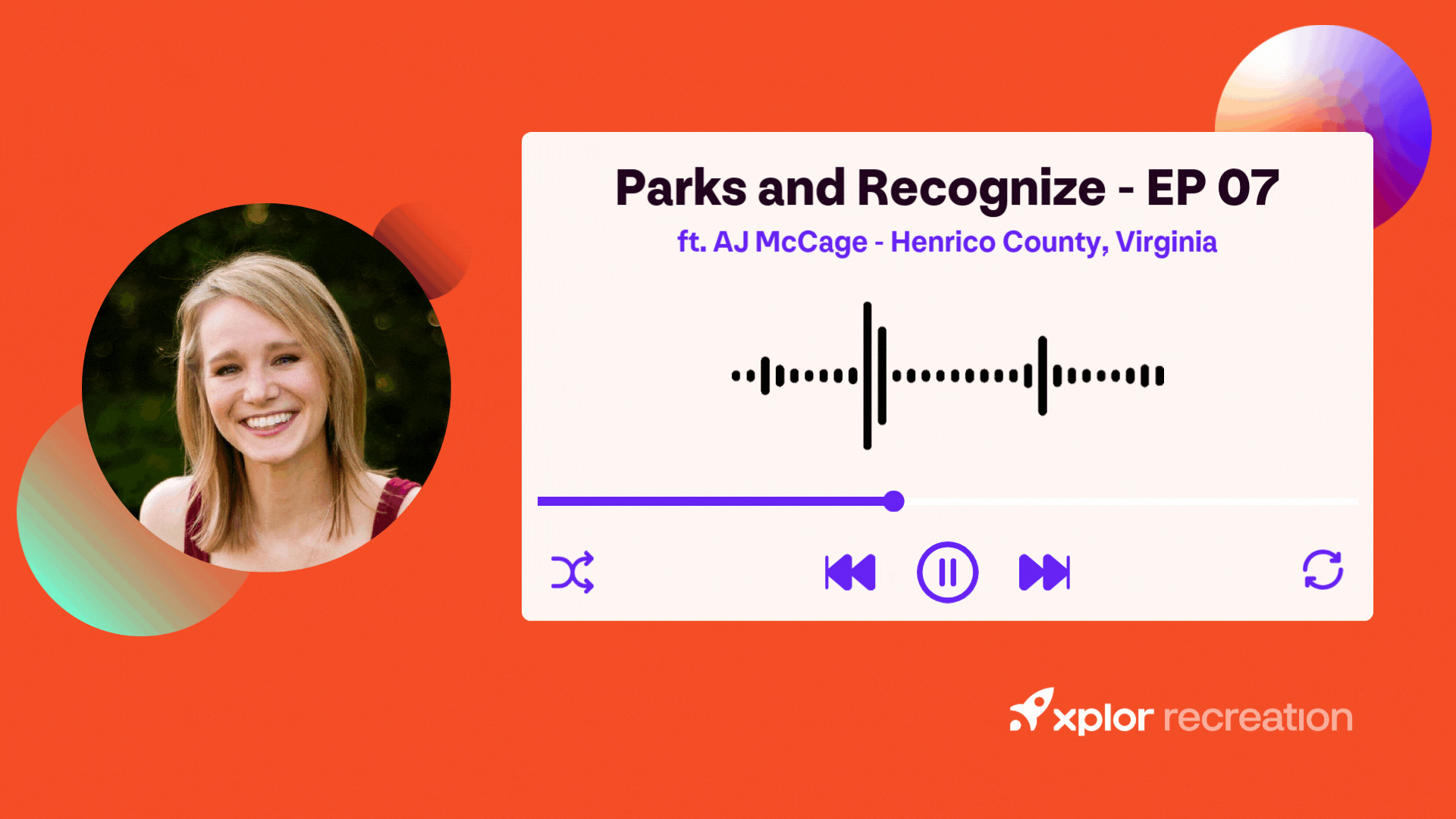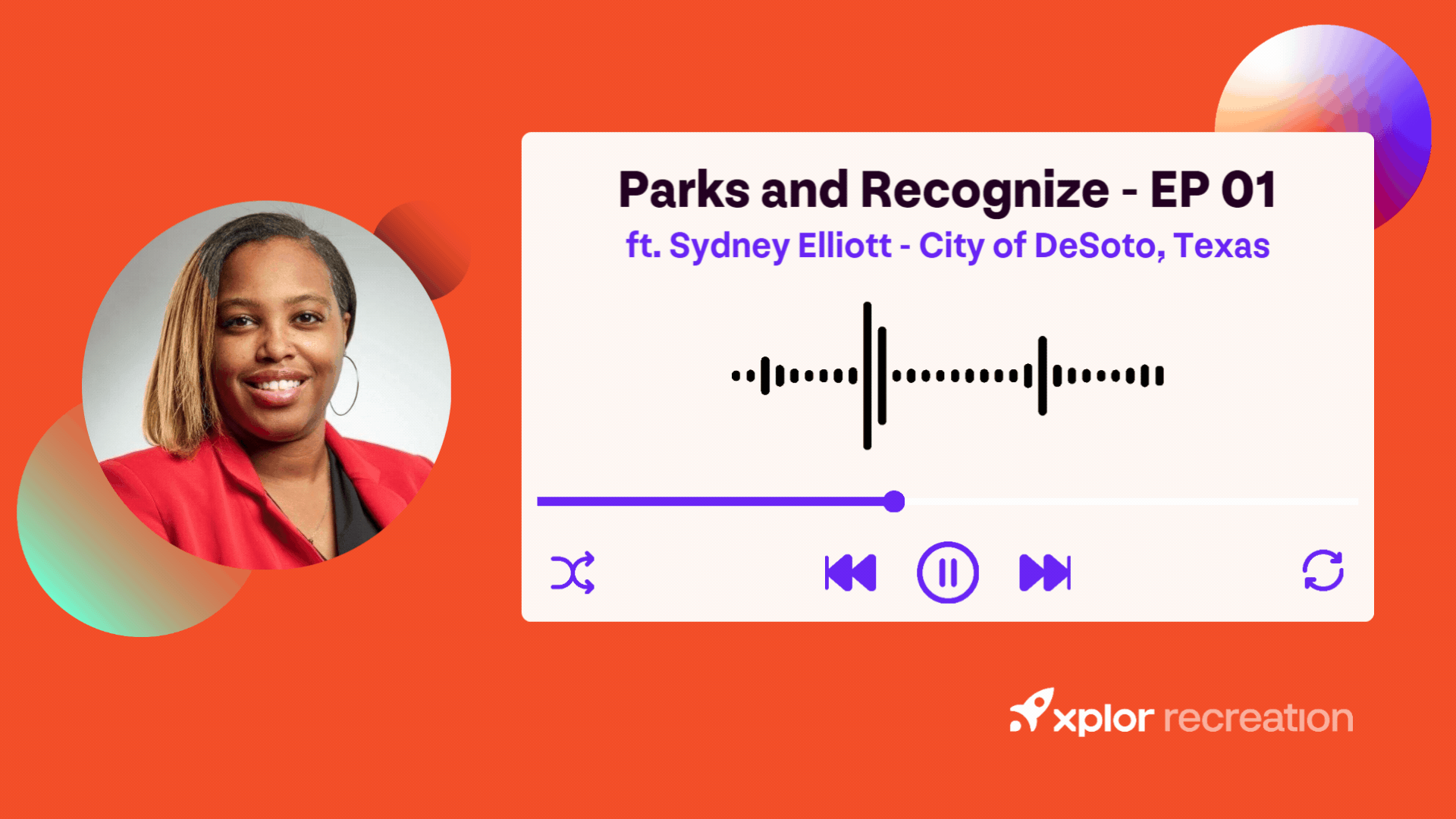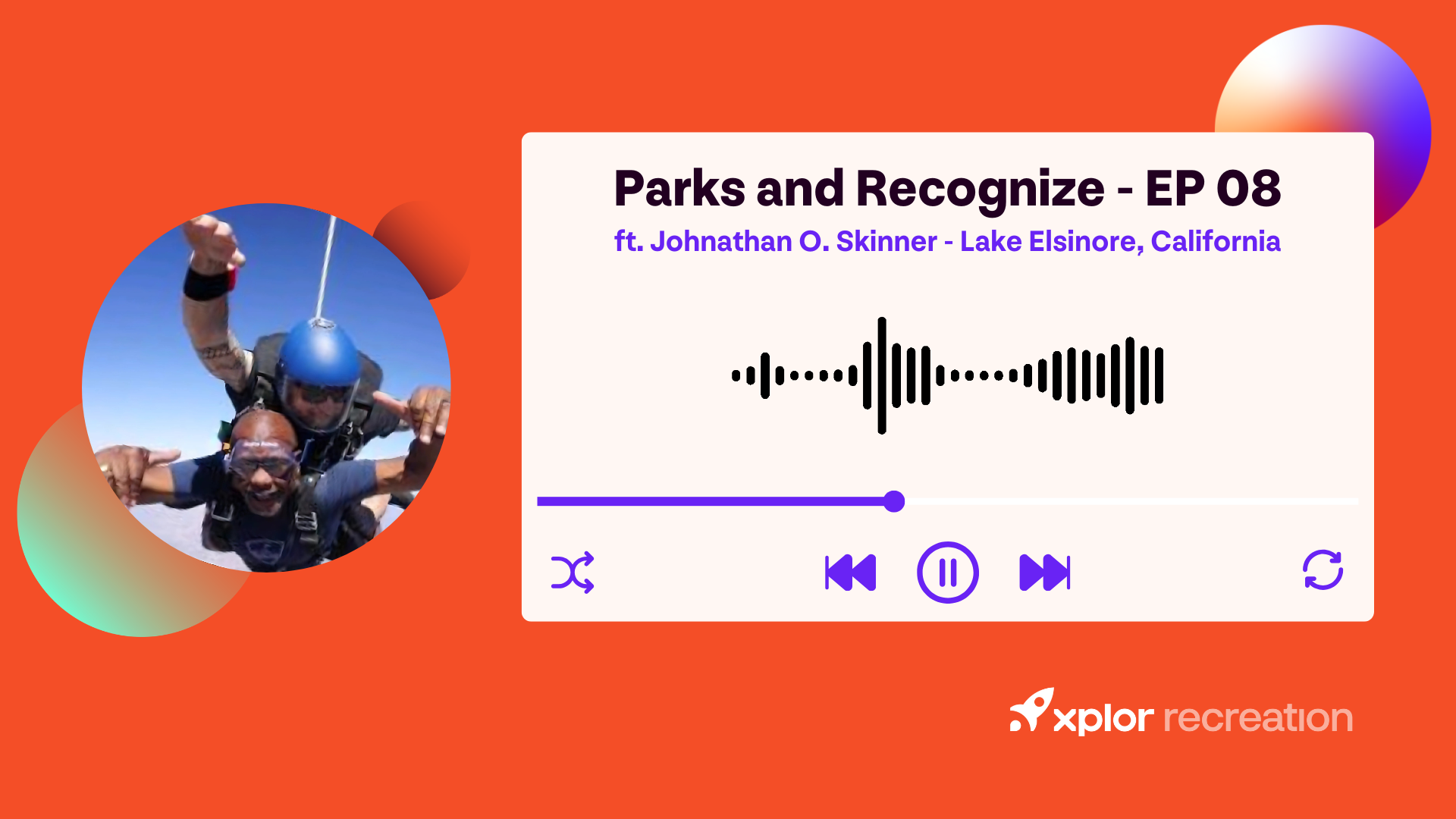The Parks and Recognize Podcast - Episode 3 with Miranda Maloy
In our third podcast episode, Datis Mohsenipour, VP of Marketing at Xplor Recreation had the pleasure of speaking to Miranda Maloy, Recreation Program Supervisor at the City of Lewisville, Texas.
Miranda has spent over 12 years working in parks, recreation and leisure, earning accolades and demonstrating a strong commitment to continuous learning. Currently pursuing her doctorate of education in Leadership and Learning in Organizations at Vanderbilt University, she exemplifies commitment to professional growth. Miranda has been recognized with the prestigious 30 Under 30 Award from the NRPA Young Professional Network and Parks & Recreation Magazine, as well as the NRPA Young Professional Fellowship.
Outside of the workplace, Miranda continues to expand her expertise within the industry, as she is in the process of starting her own consulting agency and is a highlighted speaker at this year's upcoming 2024 NRPA Annual Conference.
Listen to the podcast or read the interview transcription below to dive into the story behind Miranda, her extraordinary career path, and the positive change she aims to bring to parks and recreation.
Listen to Episode 3 of Parks and Recognize:
Prefer to Read the Interview? See Below.
Datis: What song is currently on repeat in your playlist right now?
Miranda: Oh, this is a really good one because I bounce around a lot in music. This is not a typical answer for me, but I have really been digging the new Billie Eilish album. I've been listening to Chihiro on repeat. It's really different, I like it.
Datis: Tell us a little bit about what you do and where you do the work that you do.
Miranda: I am what they call a recreation program supervisor. I do that in the wonderful city of Lewisville, Texas, at a recreation center called Thrive, and basically what I do is I get to plan all of the really fun special events and outreach initiatives. I do a little bit of marketing, really a jack of all trades, but my title is recreation program supervisor.
Datis: How long have you been actively working in the parks and rec space?
Miranda: I've been in parks and rec specific for six years now.
Datis: Prior to that, kind of adjacent to the parks and rec world?
Miranda: Yeah, I was in leisure services, essentially. I was in a nonprofit, kind of community outreach and leisure. I used to work for the Boys and Girls Club. All in all, it's been twelve years, which is exciting and terrifying to say.
Datis: What ultimately led you to your career in, let's say the leisure and parks and recreation world?
Miranda: I really love question this because when I was younger, I think I felt like most young people do. I was very lost, I didn't know what I wanted to do. I wanted to be a little bit of everything, so I had no real ambition or drive or maybe too much. I didn't know where to go, I kind of got very, ‘I don't want to shoehorn myself into one area’. I grew up in Cincinnati, Ohio. I lived there for twenty years and then I ended up moving to Texas to live with my dad. That was kind of what kick started me dipping my toes into this water. I got a job working for the Boys and Girls Club as an art teacher. I started out with that because art was my great passion. I was convinced that's what I was meant to do, and I just kind of evolved from there. It became so much more than just teaching the kids art, it became engaging with them, and learning about them and being there for them. My kids really sparked this love of community and people and getting to know people's stories. It was so much more it was like art in real life, essentially. I went from being the art teacher to being a program supervisor, and I ended up becoming a family engagement specialist which meant my whole job was connecting families with resources like SNAP and TANF and stuff like that. It was just the most heartwarming thing, it really made me feel complete. From there, I just kind of kept bouncing around from different boys and girls clubs until I ended up in a municipality in Temple, Texas, where I was for about five years. I think the really beautiful thing about my job and this field is that I never do the same thing twice. Every day is very unique and different, and I get to be the artist. My degree was being a therapist, so I get to be a therapist sometimes, unofficially. I get to be a cheerleader, a musician, I get to be all these wonderful things with these kids. I love what I do.
Datis: Miranda, what does community mean to you?
Miranda: Oh, it's so many things. I think specifically to me, community has always been the cornerstone of a good life. I feel like in order to have these things that you need to become the best version of yourself, you really need to have community. Community is memories, its families getting together, it's the things that you do. It's the people that you turn to whether they're your blood relatives or neighbors on the street or even just people passing by. I feel like a good indicator of a good community is if you're walking down the street, people smile and say hi to you. That's when you know that you've got a community that's really thriving and loves where they are. I think community can mean so many things, but to me specifically in this role, community has always been about the people that you meet and the mark that you make on each other's lives. I have tons of memories over my twelve years of people that I've met and the funny things that kids have said or the heartwarming exchanges I've had with seniors. To me, that's what community is. It's just the feeling that you get when you go home at the end of the day and you're like, ‘man, I made a difference and this was really cool’.

Datis: If you can narrow down a couple of moments in your professional career that you're most proud of, what would they be and why?
Miranda: Oh, that's hard, there've been quite a few that I've been very proud of. If I had to pick maybe three to highlight, I think the first one was getting accepted into my doctoral program. I think getting my bachelor's and my master's was a huge accomplishment. I'm the first of my family to go through school and I told myself ‘oh, once I get my master's, I'm done, that's it’, and I kind of had this dream of being Dr. Malloy or Dr. Miranda. But getting accepted into my doctoral program really was one of the biggest accomplishments of my life and getting the opportunity to go do that. I currently attend Vanderbilt, and I'm getting my doctorate in leadership and learning in organizations so that I can go on in my work with public management and working with people and stuff of that nature. I feel like it's very translatable to what I do, not just in parks and recreation, but in community service, customer service, just helping out. I think it's great, the sky's the limit with that, so that's a really big one. Another one would be definitely winning my awards from NRPA. The 30 Under 30 really took me by surprise. That was a huge accomplishment of mine, and then most recently getting the Young Professional Fellowship. I cried, I definitely cried tears when Michael called me about it. Just being recognized by an organization that means so much to me is insane. But I think the thing that I'm the most proud of over twelve years was when I was working in Temple, and I had just started. I am a very proud Hispanic woman and it meant a great deal to me to be very open and loud and colorful and be myself. I noticed that there was a very large Hispanic community around us, and so I was like, ‘well, why don't we just celebrate? Let's celebrate Día de los Muertos together, the Day of the Dead’, because it had always meant so much to me. My very first year putting it on I did not know what to expect. I was hoping maybe ten people would come through my rec center. We ended up having six hundred and fifty people come through over the course of the three-hour event. That was an amazing, tremendous day in my life. I think even that would be really cool just as an accomplishment. The best part was at the tail end as we're wrapping up and my feet are sore, I'm dying to get my shoes off and take my makeup off because I had full calavera face paint on. I had a very sweet older woman come up to me and she grabbed my hands and she was crying and she said, ‘I really appreciate this, it's wonderful to see ourselves in our community and I really appreciate this’. One of the big parts of Day of the Dead is an ofrenda, which is an altar. We had a community one and I did not have any expectations for it. We put some paper up on the wall and it was like, just leave a message. At the end of the event, we had the entire wall covered in handwritten letters and notes and pictures people had printed of their deceased loved ones and brought to celebrate. By her saying that and seeing that in my mind, I was like, ‘you know what, that is just the coolest thing I've ever done in my life’. I'm constantly chasing that feeling of, ‘I know I made a difference here’. I think everyone that gets into this job does it because of the difference we make, certainly not for the money. But I think everyone, every parks professional you meet that's been in it for more than a couple of years has one of those stories.
Datis: I know you're involved with associations. And I want to ask you a little bit about your involvement there.
Miranda: As far as TRAPS and NRPA goes, I think I got introduced to both organizations when I first started in the city of Temple. I was astounded by the level of work they did and how involved they were, even on such a micro level. It was impressive to see a national organization like NRPA engaged with a small city like Temple, Texas. I first started attending some of the trainings like at the TRAPS regionals and some online webinars through NRPA. I really got a taste of something that I truly, truly enjoy. I love obviously learning and lifelong learning, that's why I torture myself by going to school all the time. That was my first kind of foray into those organizations, then it just kind of grew from there, and TRAPS we held a regional conference in Temple, I think two and a half years in a row. It was supposed to rotate and then everyone felt we all did it so well, so just do it again. I led the Education Task Force, I was the chair for that so we got to find and connect with other cities and get them to come speak at the conference. Then because I had done that on a regional level, it went to the state level. And I currently help with the Education Task Force for the state conference, so in addition to doing trainings for them, I help pick different trainers that come to the conference as well. Then for NRPA, I've done a lot of their certificate programs, like their equity program. It was a phenomenal initiative, I took that and I've done a lot of feedback work with them. I've also done guest speaking and training for them. I'm one of the highlighted speakers at the NRPA conference this year as well. I get to prerecord my session, actually at the end of next month, so that'll be involved. It'll be available in the virtual conference, so if you don't get to come to NRPA in Atlanta, you can still take my session.
Datis: In your spare time in any given week, what can we catch you doing?
Miranda: Oh, it depends on my mood on the day. Some days I like to just go full goblin mode and just sit in bed and not get up. There's some days my body's just like, ‘stop, let's stop’. Then I will just binge watch shows on all the streaming services. Most days, I'm with my kids, playing outside or we're doing something, running around somewhere. I have two stepchildren that are seventeen and sixteen, and then I have a biological that just turned seven. So, I am a full spectrum mom. We're always running around doing something, going to the mall, dealing with drama. Most times I'm doing that, spending time with the family. Most recently I've been spending some time doing some personal investment in myself because I love training. I love sharing the wealth of knowledge I've accumulated over twelve years, so I am currently undertaking an endeavor of starting my own consulting agency. By the time I retire and however many years down the line, hopefully, I'll have a base. But I'm starting to create my own consulting firm to go out and help educate groups and communities on how to be the best versions of themselves as possible.
Datis: What are some of the areas that you're looking to consult on?
Miranda: I think based on my experience in parks and recreation, and what I think is really valuable to people in this area is, it's so translatable. Using that as a platform, plus the addition of my background as a marriage and family therapist, and training when I got my degree. I was a counselor for several years on the side of everything, those were some fun years in my master's program, but based on that and then what I'm currently getting my doctorate in. All of this stuff I've amalgamed into an agency that I call EIRA, and it stands for Educate, Innovate, Recreate and Advocate. The consultancy stuff that I would do would be on organizational behavioral management, teamwork, conflict resolution, kind of best practices on how to get a team together, how to target a community and know where to go and really provide services. I think one of the best things that I've always loved doing was uplifting people and creating a better generation of workers and just general people, honestly. I think the advocate point of my of my consultancy is probably my favorite just because I love to do that. I love building up people and inspiring them to advocate for themselves, advocate for their community, to become a team. That’s kind of the realm that I'd be going into.
Datis: What one piece of advice would you share to other parks and rec professionals?
Miranda: It's so hard to boil it down to one, honestly. I think the one piece of advice that I would give any parks and recreation professional and really any young or old professional, would be to be authentic, be your genuine self. I think especially in a realm like parks and recreation, there's so much potential to highlight who you are because there are other people like that, too. One thing that I've trained on a lot, and this is actually what my NRPA training is on is alternative recreation. That's the marriage of like video games and live action role play and Dungeons and Dragons and stuff like that, all the stuff that I have always loved. You don't traditionally see those things in community centers or in recreation centers, but you should because there are as many, if not more health benefits to those things because there's a social realm of wellness that comes with that. There's a very strong mental health wellness that comes with those programs. I feel like when you are your genuine self, you inspire and uplift your community in a way that's necessary. There needs to be more individualism and more community. Being who you are kind of opens the door for other people to be themselves, too. Whether you are a star athlete or an artist or a big old nerd like myself. Being your authentic self makes other people comfortable and allows them to be themselves as well. It just strengthens the bonds of your community. It really just is the best thing for you, and it's the best thing for where you live as well.

Datis: When you think about, especially people who are involved in day-to-day programs with children and youth and teenagers, oftentimes people look up to them so much. Leading the way by being their authentic selves will hopefully inspire future generations to do the same and be as comfortable as they can in their own skin.
Miranda: Yeah, that's one of the questions I get asked a lot when I do trainings. I do trainings for the Girl Scouts, and parks and recreation agencies. It's always like how do you work with people, or how do you mitigate behavior problems, or how do you talk to teens and work with kids? It's the same thing that I think a lot of people forget, is that you just talk to them the way you would want to be talked to. Really, it is that golden rule. Just being authentic and having conversations, especially as kids are so much smarter than people give them credit for. My seven-year-old can talk circles around me, and I'm incredibly articulate. The next generation is learning so much faster than we did, and they're growing up with so much more that we did that it's a disservice to them to not be authentic, to be genuine and be empathetic. Just be yourself, and it really does let them know that it's safe to be themselves as well.
Datis: Well, Miranda, learning about your journey has been incredibly inspiring. There was a lot that I knew, but so much more than I've learned today. I'm sure this conversation will be very inspiring for anybody else who tunes in. I really want to thank you for taking that sliver of time that you have in your day to fit in this conversation. Congratulations on all that you do, and thank you for having such an impact on the lives of so many people.
Miranda: Thank you, I appreciate you. Thank you so much.
Wrapping it up:
Stay tuned for more inspiring episodes as we continue to spotlight remarkable parks and rec professionals. Want to share your story on a future episode of Parks and Recognize? Contact xr_marketing@xplortechnologies.com.




